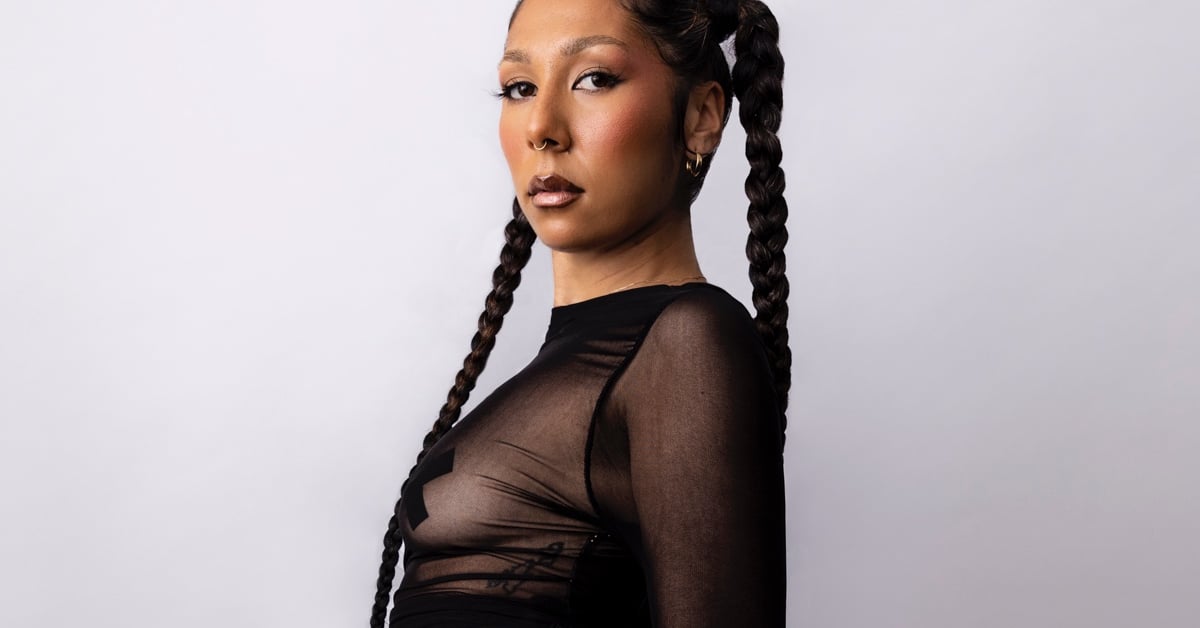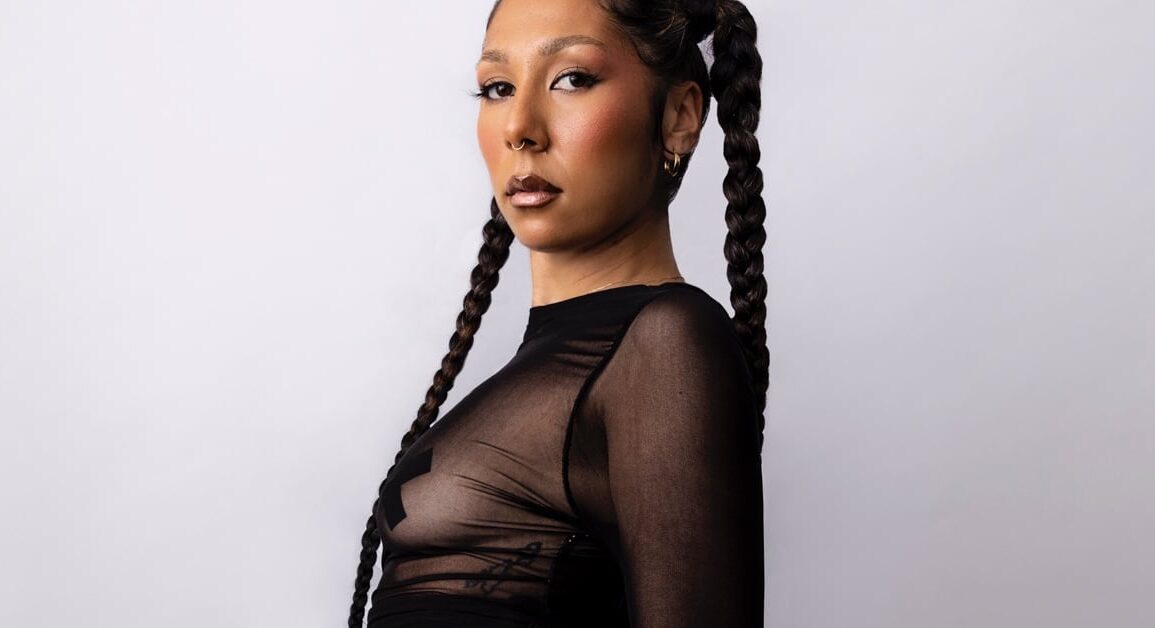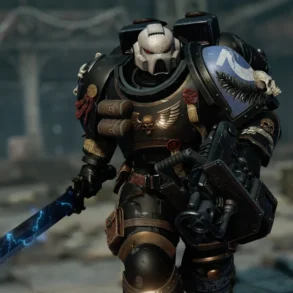
When Miss Kaninna’s manager pulled out an expensive bottle of whisky and started acting – in the artist’s own words – “really weird” right before she was about to go on stage one night, she never expected that she’d just been won the J Award for 2023 Unearthed Artist of the Year.
“I thought I was gonna get a gig or something,” she says. “I really didn’t think it was gonna happen. It was only maybe two days ago, when I posted [on Instagram] saying ‘thank you’ that it really kind of hit home that, you know, I did that.”
Triple j Unearthed has launched the careers of Australian artists as acclaimed as Meg Mac, Stella Donnelly, King Stingray, and JK-47. Yet it’s not the only accolade that Miss Kaninna has achieved – and she’s really only been releasing music for just seven months.
Though she’s only released two singles to date – the middle-finger-up-to the government “Blak Britney” and her feisty follow-up “Pinnacle Bitch” – she’s booked innumerable big-name festivals including Laneway and Meredith. She’s been nominated and won various awards, from the SXSW Justin Cosby Award for Best Emerging Artist to the Archie Roach Foundation Award for Emerging Talent. And she’s been the name on every industry person’s lips as they search for the next big artist to break on Australian shores.
Considering where she began, it’s been a lightning fast bolt into the limelight.
You don’t really hear much about artists from Tasmania. Those from the biggest cities – Sydney, Melbourne, even Brisbane and sometimes Perth – dominate the soundwaves. But Miss Kaninna is a proud Yorta Yorta, Djadja Wurrung, Kalkadoon, and Yirendali woman who grew up within that small, isolated population, specifically on the tiny island of Bruny.
Her mum was in a funk-reggae band that featured instruments like violin and African drums. “It was really cool to grow up around so many different cultures,” she says. “We have such a big community. That’s when I started being around music from a young age.”
The school curriculum wasn’t really made for Miss Kaninna because of her dyslexia, and instead she found solace in being a performer.
“Growing up [I was told] that I [was] dumb at math and science and, I mean, I can’t be dumb because I’m hell good at music,” she says, “so I started doing a bit more music and I lent way more into my acting and dancing. [It] really solidified the dream of wanting to be a performer.”
It was between school and adulthood that Miss Kaninna admits she “got a bit lost… I was constantly trying to please other people.” She ended up completing three years of nursing, with music put on the back burner before later rekindling her love for it a while later.
“I just kind of made one song and then I got to open for a band in Tassie,” she recalls. “I was like, ‘Shit, I’m not ready, I’ve only written one song, I can’t get on stage and do a 45-minute set. So I just did a bunch of covers. I was so nervous – I cried all day.”
But the stress of that day eventually paid off. She started getting booked at venues in Tasmania and later realised that she needed to start writing music of her own.
That was two and a half years ago now. Since then she’s made the move to Melbourne and her experience in the industry has changed drastically.
“The music thing is really under-appreciated,” she says of Tasmania, “It’s an extremely racist state. It’s right up there with Brisbane because it’s so separate from the rest of the country. There’s a heavy population of really middle aged to older white people. And the environment is very indie rock.”
Though there were pockets of pop and R&B, programmes to support artists were few and far between and opportunities were scarce; add to that a scarcity of festivals and a more broader snubbing from important figures in the industry, and the move to Melbourne felt like a necessity.
“I was sick of being a black girl growing up in a super racist state. I needed to learn more about myself and grow more comfortable in my own skin. The Tassie music thing is an interesting one, but the people in the music there are fucking beautiful. They’re so good. They’re not in it for the money and fame and shit like that. They’re just there because they love the music.”
Miss Kaninna’s first year in Melbourne has seen her attend more gigs and meet more people than she has in her whole life. “You’ve got some really big, amazing artists here who just mingle with all the small artists,” she says, “I think that’s what’s really amazing because it feels like a community. But at the same time, it’s no fucking joke here. If you’re not up to scratch, people don’t fuck with you. So you have to really put your best foot forward when you live in the inner city.”
Miss Kaninna started making R&B music predominantly about love, but it wasn’t until “Blak Britney’” a 2000’s throwback rap track, where she started gaining industry momentum.
“I was like, ‘Okay, this song helps represent me, it represents what I’m trying to convey. And it also just made me feel like I was making something for my community,” she explains.
Described as a ‘fuck you’ to the government from the perspective of a First Nations artist, “Blak Britney” was released to widespread acclaim. Over flourishes of hip hop samples that you could compare to those of early Wu-Tang, she raps coolly and unaffected: “Government said I would fail, but still I prevail, I’m a deadly bitch.”
But throughout our conversation, Miss Kaninna’s personality feels a lot more vulnerable than her public presence would lead you to believe. Her Instagram posts, for example, teeter between unapologetic activism and smouldering photos where she poses in ‘ACAB’ singlets.
Like any song that has political undertones, “Blak Britney” instigated an image of a strong Blak woman doing it for her community, which, at the time, was precisely the goal. However, a lot of layers come with that, and not all good.
“It makes me feel like I’m doing the right thing,” Miss Kaninna asserts. “I cop a lot of shit. I don’t really care that much but also I do. If we [went] through all the [messages] of people who bully me and the racism that I cop, it really doesn’t make me want to keep going. But then I have young girls come up to me or they message me and they say some really deadly shit and I’m like, ‘You know what, I’m happy to take this heat because it means that I’m influencing or I’m making somebody else’s experience a bit better.’”
Miss Kaninna’s experience is far from unique – not only is she a woman in the music industry, she’s a woman of colour with something to say – but it doesn’t make the backwards minority, so scared of change, who feel like the separation a screen affords allows them to spread petty slander, any less of a frightening ordeal.
But at any rate, these people are crucially still interacting with her music.
“Yeah, joke’s on them,” she notes, “That’s what my pop said. He said, “You’re not really doing it right if people don’t hate you anyway.’”
According to Miss Kaninna’s observations though, there’s still a long way to go.
“I think it has changed so much since I was 16 or 17 going to music festivals,” she says. “But I think the way that I tried to look at the Australian music scene is as if I was an American person, or if I was from the UK, and I typed in Australian music, what comes up? And that’s still majority white boybands or even white women.
“I’m so grateful that we have a platform now and we’re seeing a lot more Indigenous people, a lot more BIPOC people in the music industry, but I feel like we have so long to go. It’s changing, which is good, but it’s not thanks to the white people. It’s only thanks to the pushback of the community and the pushback of Blak and POC people.”
Will Miss Kaninna’s music always be of a political nature in the vein of “Blak Britney”? Actually, she’s been “thinking a lot about that lately.”
“I just want to be an artist,” she says. “I don’t want the responsibility to always educate people, that’s something people should do on their own as well. Obviously I have a platform and I‘m definitely going to be talking about what’s happening to me and my community, but that shouldn’t limit my art.”
When her debut EP arrives, she wants to show just how multifaceted she can be in her message and sound. There’ll be elements of hip hop, R&B, and pop, she hints, maybe even some soul.
“It’s got a little taste of everything I have to offer. And it kind of touches on the things we talked about before. I’m only human and I have other human experiences. So it won’t just be ‘fuck the government’ the whole time. But it definitely is that at the same time.”
Miss Kaninna performs at ALWAYS LIVE SOUNDBOX on Saturday, November 25th. More information about the event is available here.
This post was originally published on this site be sure to check out more of their content.




